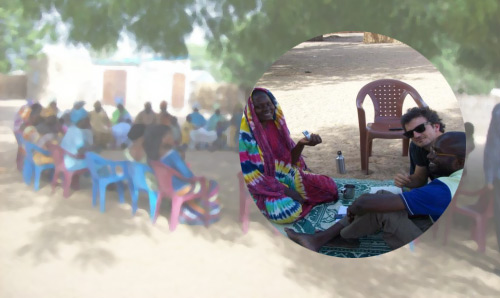What works for grassroots-led development?
Building capacity, challenging unequal power relations and creating collaborative partnerships
The challenge

Promoting bottom-up approaches to development is a major challenge different development actors face. How to institutionalise, sustain and scale-up grassroots participation in development projects? To answer this question, a new model for grassroots-led development (GLD) has been developed building on fieldwork conducted in Egypt and Senegal.
The new 3C model goes beyond 'context matters' to explaining how and why context matters. It identifies 3C processes for successful grassroots-led development, namely:
- Conscientisation at individual level: allowing individuals to think critically about their lives and to aspire for better ones
- Conciliation at communal level: creating a common vision and reconciling individuals' and communal interests
- Collaboration at institutional level: promoting partnerships between local communities and development actors (eg the state, NGOs and international donors)
Impact: Our new model has been applied on Tostan's community empowerment program (CEP) which has been implemented in Senegal and five other West African countries for the past thirty years. Through extensive fieldwork in rural and urban contexts, the research revealed how communal empowerment programs - like Tostan's - can induce individual and behavioural changes; create communal vision and promote effective partnerships among different development actors.
An ESRC Impact Acceleration Account fund (2015/16) allowed us to further widen the impact of this research in a number of ways:
- Linking up with Tostan's national coordinators in five other African countries – Guinea, Guinea-Bissau, Mali, Mauritania and The Gambia and discussing the new model with them in an impact workshop held in Dakar in November 2015. The workshop allowed the national coordinators from six African countries to discuss the new 3C model and to discuss ways to integrate it within their work. It also allowed them to contribute their own insights on the potentials and limitations of implementing Tostan's community empowerment programs in their respective contexts.
- Linking up with international donors, national and international NGOs, especially those working on communal-led development in West Africa. In a second workshop in November 2015, Tostan's national coordinators along with policymakers and representatives from national and international donor agencies and NGOs debated the current aid system and the means to effectively challenge the unequal power relations embedded in it. Discussions from both workshops were presented in two summary reports.
- Drafting a new practitioners' guide on 'What works for grassroots-led development' which sums up the challenges practitioners and donors face when implementing the "3C" and discusses ways of overcoming these challenges.
A third workshop will be organised at The University of Manchester in 18 April 2016 to engage UK-based policymakers, academics and practitioners in further discussions on how to render grassroots-led processes more successful, sustainable and scalable.
Through these three workshops, the project will produce three policy briefs and a final draft of the practitioners' guide on grassroots-led development that will be useful sources for development practitioners and academics alike.
Our research
Our research seeks to conceptualise grassroots-led development. It does not simply highlight success stories or case studies of communal empowerment to 'finally' conclude that 'context matters' (something several other studies have already done). Instead, the new 3C model presents a new practical framework to explain the dynamics of grassroots led development and to identify the different factors that affect its success, sustainability and scalability. Drawing on comparative inter- and intra-country case studies, the research contrasts grassroots-led initiatives in rural and urban contexts and examines how these initiatives can be means for sustainable human development at the grassroots.
Key outcomes
- Strengthened the capacity of development practitioners to promote and support grassroots-led processes
- Knowledge exchange between representatives from donor agencies, NGO practitioners and academics working on GLD.
- New resources on grassroots-led development, such as a practitioners' guide and policy briefs
- Establishing a network of academics, practitioners and policymakers working on GLD to exchange best practice and refine the 3C model.
Key people
- Dr. Solava Ibrahim (The University of Manchester)
- Ben Cislaghi (Tostan International)
